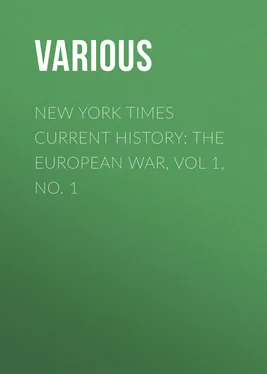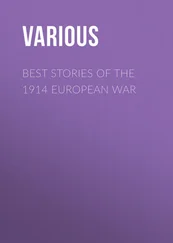Various - New York Times Current History - The European War, Vol 1, No. 1
Здесь есть возможность читать онлайн «Various - New York Times Current History - The European War, Vol 1, No. 1» — ознакомительный отрывок электронной книги совершенно бесплатно, а после прочтения отрывка купить полную версию. В некоторых случаях можно слушать аудио, скачать через торрент в формате fb2 и присутствует краткое содержание. Жанр: foreign_edu, periodic, История, на английском языке. Описание произведения, (предисловие) а так же отзывы посетителей доступны на портале библиотеки ЛибКат.
- Название:New York Times Current History: The European War, Vol 1, No. 1
- Автор:
- Жанр:
- Год:неизвестен
- ISBN:нет данных
- Рейтинг книги:4 / 5. Голосов: 1
-
Избранное:Добавить в избранное
- Отзывы:
-
Ваша оценка:
- 80
- 1
- 2
- 3
- 4
- 5
New York Times Current History: The European War, Vol 1, No. 1: краткое содержание, описание и аннотация
Предлагаем к чтению аннотацию, описание, краткое содержание или предисловие (зависит от того, что написал сам автор книги «New York Times Current History: The European War, Vol 1, No. 1»). Если вы не нашли необходимую информацию о книге — напишите в комментариях, мы постараемся отыскать её.
New York Times Current History: The European War, Vol 1, No. 1 — читать онлайн ознакомительный отрывок
Ниже представлен текст книги, разбитый по страницам. Система сохранения места последней прочитанной страницы, позволяет с удобством читать онлайн бесплатно книгу «New York Times Current History: The European War, Vol 1, No. 1», без необходимости каждый раз заново искать на чём Вы остановились. Поставьте закладку, и сможете в любой момент перейти на страницу, на которой закончили чтение.
Интервал:
Закладка:
I may now, without more than the irreducible minimum of injustice to Sir Edward Grey, proceed to tell the story of the diplomatic negotiations as they will appear to the Congress which, I am assuming, will settle the terms on which Europe is to live more or less happily ever after.
Diplomatic History of the War.
The evidence of how the Junker diplomatists of our Foreign Office let us in for the war is in the White Paper, Miscellaneous No. 6 (1914), containing correspondence respecting the European crisis, and since reissued, with a later White Paper and some extra matter, as a penny bluebook in miniature. In these much-cited and little-read documents we see the Junkers of all the nations, the men who have been saying for years "It's bound to come," and clamouring in England for compulsory military service and expeditionary forces, momentarily staggered and not a little frightened by the sudden realization that it has come at last. They rush round from foreign office to embassy, and from embassy to palace, twittering "This is awful. Can't you stop it? Won't you be reasonable? Think of the consequences," etc., etc. One man among them keeps his head and looks the facts in the face. That man is Sazonoff, the Russian Secretary for Foreign Affairs. He keeps steadily trying to make Sir Edward Grey face the inevitable. He says and reiterates, in effect, "You know very well that you cannot keep out of a European war. You know you are pledged to fight Germany if Germany attacks France. You know that your arrangments for the fight are actually made; that already the British army is commanded by a Franco-British Council of War; that there is no possible honourable retreat for you. You know that this old man in Austria, who would have been superannuated years ago if he had been an exciseman, is resolved to make war on Servia, and sent that silly forty-eight hours ultimatum when we were all out of town so that he could begin fighting before we could get back to sit on his head. You know that he has the Jingo mob of Vienna behind him. You know that if he makes war, Russia must mobilize. You know that France is bound to come in with us as you are with France. You know that the moment we mobilize, Germany, the old man's ally, will have only one desperate chance of victory, and that is to overwhelm our ally, France, with one superb rush of her millions, and then sweep back and meet us on the Vistula. You know that nothing can stop this except Germany remonstrating with Austria, and insisting on the Servian case being dealt with by an international tribunal and not by war. You know that Germany dares not do this, because her alliance with Austria is her defence against the Franco-Russian alliance, and that she does not want to do it in any case, because the Kaiser naturally has a strong class prejudice against the blowing up of Royal personages by irresponsible revolutionists, and thinks nothing too bad for Servia after the assassination of the Archduke. There is just one chance of avoiding Armageddon: a slender one, but worth trying. You averted war in the Algeciras crisis, and again in the Agadir crisis, by saying you would fight. Try it again. The Kaiser is stiffnecked because he does not believe you are going to fight this time. Well, convince him that you are. The odds against him will then be so terrible that he may not dare to support the Austrian ultimatum to Servia at such a price. And if Austria is thus forced to proceed judicially against Servia, we Russians will be satisfied; and there will be no war."
Sir Edward could not see it. He is a member of a Liberal Government, in a country where there is no political career for the man who does not put his party's tenure of office before every other consideration. What would The Daily News and The Manchester Guardian have said had he, Bismarck-like, said bluntly: "If war once breaks out, the old score between England and Prussia will be settled, not by ambassadors' tea parties and Areopaguses, but by blood and iron?" In vain did Sazonoff repeat, "But if you are going to fight, as you know you are, why not say so?" Sir Edward, being Sir Edward and not Winston Churchill or Lloyd George, could not admit that he was going to fight. He might have forestalled the dying Pope and his noble Christian "I bless peace" by a noble, if heathen, "I fight war." Instead, he persuaded us all that he was under no obligation whatever to fight. He persuaded Germany that he had not the slightest serious intention of fighting. Sir Owen Seaman wrote in Punch an amusing and witty No-Intervention poem. Sporting Liberals offered any odds that there would be no war for England. And Germany, confident that with Austria's help she could break France with one hand and Russia with the other if England held aloof, let Austria throw the match into the magazine.
The Battery Unmasked.
Then the Foreign Office, always acting through its amiable and popular but confused instrument Sir Edward, unmasked the Junker-Militarist battery. He suddenly announced that England must take a hand in the war, though he did not yet tell the English people so, it being against the diplomatic tradition to tell them anything until it is too late for them to object. But he told the German Ambassador, Prince Lichnowsky, caught in a death trap, pleaded desperately for peace with Great Britain. Would we promise to spare Germany if Belgium were left untouched? No. Would we say on what conditions we would spare Germany? No. Not if the Germans promised not to annex French territory? No. Not even if they promised not to touch the French colonies? No. Was there no way out? Sir Edward Grey was frank. He admitted there was just one chance; that Liberal opinion might not stand the war if the neutrality of Belgium were not violated. And he provided against that chance by committing England to the war the day before he let the cat out of the bag in Parliament.
All this is recorded in the language of diplomacy in the White Paper on or between the lines. That language is not so straightforward as my language; but at the crucial points it is clear enough. Sazonoff's tone is politely diplomatic in No. 6; but in No. 17 he lets himself go. "I do not believe that Germany really wants war; but her attitude is decided by yours. If you take your stand firmly with France and Russia there will be no war. If you fail them now, rivers of blood will flow, and you will in the end be dragged into war." He was precisely right; but he did not realize that war was exactly what our Junkers wanted. They did not dare to tell themselves so; and naturally they did not dare to tell him so. And perhaps his own interest in war was too strong to make him regret the rejection of his honest advice. To break up the Austrian Empire and achieve for Russia the Slav Caliphate of South-East Europe whilst defeating Prussia with the help of France and of Russia's old enemy and Prussia's old ally England, was a temptation so enormous that Sazonoff, in resisting it so far as to shew Sir Edward Grey frankly the only chance of preventing it, proved himself the most genuine humanitarian in the diplomatic world.
Number 123.
The decisive communication between Sir Edward Grey and Prince Lichnowsky is recorded in the famous No. 123. With the rather childish subsequent attempt to minimize No. 123 on the ground that the Prince was merely an amiable nincompoop who did not really represent his fiendish sovereign, neither I nor any other serious person need be concerned. What is beyond all controversy is that after that conversation Prince Lichnowsky could do nothing but tell the Kaiser that the Entente , having at last got his imperial head in chancery, was not going to let him off on any terms, and that it was now a fight to a finish between the British and German empires. Then the Kaiser said: "We are Germans. God help us!" When a crowd of foolish students came cheering for the war under his windows, he bade them go to the churches and pray. His telegrams to the Tsar (the omission of which from the penny bluebook is, to say the least, not chivalrous) were dignified and pathetic. And when the Germans, taking a line from the poet they call "unser Shakespeare," said: "Come the four quarters of the world in arms and we shall shock them," it was, from the romantic militarist point of view, fine. What Junker-led men could do they have since done to make that thrasonical brag good. But there is no getting over the fact that, in Tommy Atkins's phrase, they had asked for it. Their Junkers, like ours, had drunk to The Day; and they should not have let us choose it after riling us for so many years. And that is why Sir Edward had a great surprise when he at last owned up in Parliament.
Читать дальшеИнтервал:
Закладка:
Похожие книги на «New York Times Current History: The European War, Vol 1, No. 1»
Представляем Вашему вниманию похожие книги на «New York Times Current History: The European War, Vol 1, No. 1» списком для выбора. Мы отобрали схожую по названию и смыслу литературу в надежде предоставить читателям больше вариантов отыскать новые, интересные, ещё непрочитанные произведения.
Обсуждение, отзывы о книге «New York Times Current History: The European War, Vol 1, No. 1» и просто собственные мнения читателей. Оставьте ваши комментарии, напишите, что Вы думаете о произведении, его смысле или главных героях. Укажите что конкретно понравилось, а что нет, и почему Вы так считаете.











